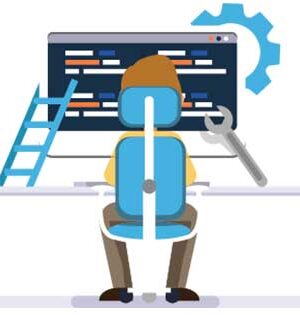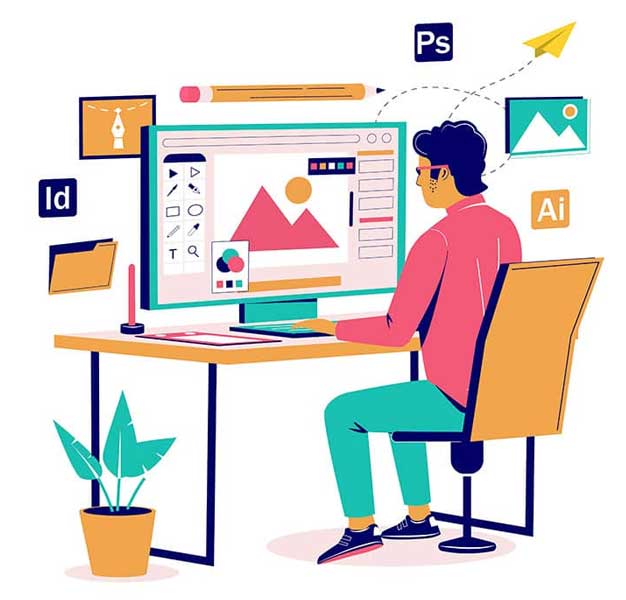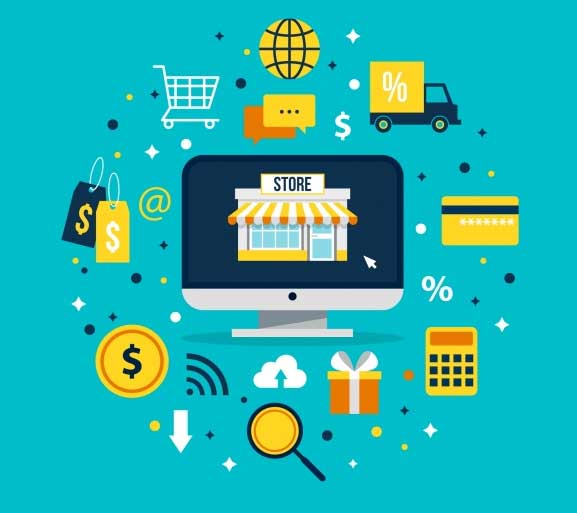OUTSOURCE IT SERVICES
Web Development Services
Digital Marketing Services
E-Commerce Development
Software Development Services
Comprehensive Guide to IT Services: Empowering Businesses in the Digital Era
IT services is playing a critical role in helping businesses streamline operations, increase efficiency, and foster innovation. Whether it’s web development, digital marketing, or e-commerce store development, enterprise IT services provide the infrastructure and expertise required to meet evolving business demands.
Types of IT Services: Meeting Diverse Business Needs
IT services cover a vast array of solutions tailored to meet specific business challenges. Here are some of the most impactful types:
- Web Development: Creating a professional, dynamic, and user-friendly website is vital for businesses looking to establish a strong online presence. Web development services encompass designing, coding, and maintaining websites to ensure high performance and seamless user experiences.
- Digital Marketing: Digital marketing services are essential for businesses seeking to boost their visibility online. From SEO (Search Engine Optimization) to social media marketing and PPC campaigns, digital marketing ensures businesses can reach and engage their target audience effectively.
- E-Commerce Store Development: The global shift toward online shopping has made e-commerce store development crucial for businesses. IT services help create secure, scalable, and intuitive online stores that drive sales and enhance customer satisfaction.
- Application Development: Application development services provide customized software solutions to address unique business needs. Whether it’s a mobile app for customer interaction or enterprise software to streamline operations, these services ensure optimal functionality and performance.
- Game Development Services: The gaming industry continues to grow, and game development services offer immersive and engaging experiences for users. IT services help design, develop, and launch games tailored to specific audiences, ensuring maximum entertainment value.
Benefits of IT Services: Why Your Business Needs Them
IT services provide a host of advantages that enable businesses to thrive in a competitive market. Here’s why you should consider investing in AI-driven IT services:
- Enhanced Productivity: By automating repetitive tasks and optimizing workflows, IT services allow teams to focus on strategic initiatives rather than manual processes.
- Cost Efficiency: Affordable IT support services and outsourcing reduce the need for in-house resources, cutting operational costs significantly.
- Improved Security: Advanced cybersecurity services safeguard data and systems, giving businesses peace of mind.
- Scalability and Flexibility: With cloud computing solutions and custom IT services packages, businesses can easily scale their IT infrastructure to meet growing demands.
- Better Customer Experience: Consistent and accurate customer data cleansing allows for better personalization and communication, strengthening customer relationships.
Choosing the Right IT Services Partner:
Selecting the top IT service providers can make or break your digital transformation journey. Here’s how to identify the best partner for your business:
- Evaluate Their Expertise: Ensure the provider has proven experience in areas like web development, application development, e-Commerce development services and digital marketing services. Ask for case studies and portfolios.
- Check Their Reputation: Research client reviews, testimonials, and online ratings. A trusted provider should have a track record of delivering high-quality remote IT solutions.
- Assess Customization Capabilities: Every business has unique needs. Choose a provider that offers small business IT services packages tailored to your objectives.
- Prioritize Scalability: Your IT service management partner should be able to grow alongside your business, offering scalable solutions like cloud-based IT services.
- Ensure Proactive Support: Reliable IT support services include round-the-clock assistance and proactive monitoring to prevent issues before they arise.
Future Trends in IT Services: Shaping the Digital Landscape
The IT services industry is constantly evolving, driven by technological advancements, changing consumer behaviors, and the growing need for efficiency and innovation. Key sectors like web development, digital marketing, app development, game development, and e-commerce development are at the forefront of this transformation. Staying ahead of these trends is essential for businesses aiming to remain competitive and deliver exceptional value to their customers.
1. Future Trends in Web Development:
- Progressive Web Applications (PWAs): PWAs combine the best of web and mobile applications, offering fast loading times, offline functionality, and improved user engagement. As businesses seek cost-effective IT solutions for startups, PWAs are becoming the go-to choice for delivering app-like experiences through web browsers.
- AI-Powered Personalization: Websites will increasingly use artificial intelligence to deliver personalized user experiences. From tailored content to predictive recommendations, AI will revolutionize how users interact with websites.
- Voice Search Optimization: As voice assistants like Alexa and Siri grow in popularity, optimizing websites for voice search will become essential. This includes using natural language processing and long-tail keywords.
- Web 3.0 and Decentralized Apps (DApps): The next iteration of the web, Web 3.0, focuses on decentralization, blockchain integration, and enhanced data security. Businesses will invest in decentralized applications to provide transparent and secure digital experiences.
- Responsive Design for Wearable Devices: With the rise of smartwatches and other wearables, websites will need to adapt to new screen sizes and formats, ensuring seamless usability across all devices.
2. Future Trends in Digital Marketing:
- AI and Machine Learning in Marketing: AI will dominate digital marketing, enabling businesses to analyze data, predict customer behavior, and automate marketing campaigns. Tools like chatbots and personalized ads will redefine customer engagement.
- Voice and Visual Search: Consumers are increasingly using voice commands and images to search for products and services. Optimizing for visual and voice search will be a key focus for digital marketers.
- Content Marketing Evolution: Video and AR/VR: Video content, including live streams and short-form videos, will continue to dominate. Additionally, augmented reality (AR) and virtual reality (VR) will create immersive content experiences, especially for product showcases.
- Data Privacy and Ethical Marketing: As data privacy regulations tighten, businesses will need to prioritize ethical marketing practices and transparent data collection. Building trust will be as important as delivering results.
- Micro-Influencer Marketing: Instead of partnering with mega-influencers, brands will turn to micro-influencers who have niche audiences. These collaborations often lead to higher engagement and more authentic connections.
3. Future Trends in Application Development:
- Low-Code and No-Code Development: As businesses look to accelerate app deployment, low-code and no-code platforms will become mainstream. These tools enable users to build applications without extensive programming knowledge.
- Super Apps: Super apps combine multiple services (e.g., messaging, payments, shopping) into a single platform. Inspired by apps like WeChat, businesses will explore developing all-in-one solutions for enhanced convenience.
- IoT-Integrated Apps: With the Internet of Things (IoT) expanding, app developers will focus on creating solutions that seamlessly connect with smart devices, offering real-time data and automation.
- AI and Machine Learning Integration: AI-driven apps will offer personalized experiences, from recommendation engines to intelligent assistants, transforming user interaction and problem-solving.
- Focus on Cybersecurity: As cyber threats evolve, app development will prioritize security features like end-to-end encryption, biometric authentication, and secure APIs to protect user data.
4. Future Trends in Game Development:
- Cloud Gaming: With the rise of platforms like Google Stadia and Xbox Cloud Gaming, cloud gaming is becoming the future. Gamers can stream high-quality games without requiring powerful hardware, making gaming more accessible.
- Virtual Reality (VR) and Augmented Reality (AR): Immersive gaming experiences through VR and AR will continue to gain traction, offering lifelike visuals and interactive gameplay. Developers will focus on creating content for headsets like Oculus and AR glasses.
- Blockchain and NFTs in Gaming: Blockchain technology will enable decentralized gaming ecosystems, while non-fungible tokens (NFTs) will allow players to own and trade in-game assets securely.
- AI-Powered NPCs and Storylines: Artificial intelligence will make non-playable characters (NPCs) smarter and more responsive. It will also enable dynamic, player-driven storylines, offering unique experiences for every gamer.
- Cross-Platform Gaming: As players demand flexibility, cross-platform gaming will become the norm, allowing seamless gameplay across consoles, PCs, and mobile devices.
5. Future Trends in E-Commerce Development:
- AI-Powered Personalization: E-commerce platforms will leverage AI to analyze user behavior, offering personalized product recommendations, dynamic pricing, and tailored shopping experiences.
- AR for Product Visualization: Augmented reality will enable customers to visualize products in real-world settings, like trying on clothes virtually or previewing furniture in their homes.
- Voice Commerce: Voice assistants like Alexa and Google Assistant will drive voice commerce, allowing users to make purchases with simple voice commands.
- Sustainable E-Commerce: As consumers prioritize sustainability, e-commerce businesses will adopt eco-friendly practices, from packaging to product sourcing, and highlight these efforts in their platforms.
- Subscription-Based Models: Subscription services will grow in popularity, offering convenience and consistent revenue streams for businesses. These models can range from curated product boxes to software-as-a-service (SaaS) offerings.
Case Studies: Real-World Success Stories
Case Study 1: Transforming a Small Business with Web Development: A small retail business partnered with an IT services provider for web development and digital marketing services. The result? A fully optimized website and targeted SEO campaigns that increased online traffic by 300% in six months.
Case Study 2: Boosting Sales Through E-Commerce Store Development: A startup in the fashion industry opted for e-commerce store development services. With an intuitive online platform and secure payment gateways, the business saw a 250% rise in sales within the first year.
Case Study 3: Enhancing Data Security with Cybersecurity Services: A financial institution facing repeated cyber threats partnered with a provider for cybersecurity services. By implementing robust security measures, they prevented potential breaches and built customer trust.
Debunking Common Myths About IT Services:
Despite their proven benefits, several misconceptions about IT services persist. Let’s address them:
Myth 1: IT Services Are Too Expensive: Many providers offer affordable and flexible pricing options, making IT services accessible to businesses of all sizes.
Myth 2: Only Large Corporations Need IT Services: Small and medium-sized businesses can benefit immensely from solutions like IT support services and cloud-based IT services.
Myth 3: IT Services Are Limited to Technical Support: IT outsourcing services include diverse offerings such as digital marketing, application development, and game development services.
Myth 4: IT Outsourcing Compromises Data Security: Reputable providers implement strict security protocols to ensure data protection.
Unlock the Potential of IT Services
The digital landscape is constantly evolving, and businesses must adapt to stay relevant. Whether you’re looking for web development, application development, or cybersecurity services, IT solutions can transform your operations and drive measurable growth.
Don’t wait—take the first step toward digital success today! Partner with the best IT services company and experience the benefits firsthand. Contact us now to explore how our expertise can help your business thrive in the modern world.

1. What Are IT Services, and How Do They Benefit My Business?
IT services encompass a broad range of solutions, including web development, digital marketing, app development, e-commerce store development, and game development services. These services enhance business efficiency by automating processes, improving online visibility, and delivering tailored solutions to meet specific goals. Benefits include:
- Improved productivity with automation.
- Increased sales through digital marketing services and optimized websites.
- Secure data management and enhanced cybersecurity.
2. Are IT Services Suitable for Startups?
Absolutely! Startups can benefit greatly from IT services tailored to their needs, including:
- Cloud-based IT services for scalability and cost savings.
- Low-code app development to quickly launch innovative apps.
- Digital marketing to establish brand awareness and attract early customers.
With the right IT partner, startups can compete effectively in the market and scale operations efficiently.
3. What Is the Role of Cybersecurity Services in IT Solutions?
Cybersecurity services protect your business from threats like data breaches, malware, and phishing attacks. These services include:
- End-to-end encryption for sensitive data.
- Secure network management to prevent unauthorized access.
- Regular security updates and employee training to mitigate risks.
Investing in cybersecurity ensures your business maintains customer trust and regulatory compliance.
4. How Does Cloud Computing Fit into IT Services?
Cloud computing services offer businesses flexibility, scalability, and cost-effectiveness by enabling them to:
- Store and access data securely from anywhere.
- Reduce the need for expensive on-premises hardware.
- Scale IT infrastructure based on current business needs.
Cloud solutions are a game-changer for businesses seeking agility and efficiency.
5. How Do IT Services Enhance Customer Experience?
IT services improve customer experience by:
- Creating intuitive and responsive websites.
- Offering personalized recommendations through AI-powered tools.
- Simplifying transactions with secure payment gateways.
- Providing 24/7 customer support via chatbots and live agents.
- Ensuring fast and reliable systems with proactive IT support.
6. Are IT Services Scalable for Growing Businesses?
Yes, IT services are highly scalable and can adapt to a business’s evolving needs. For example:
- Cloud-based solutions grow with your storage and processing demands.
- Websites and apps can be upgraded with advanced features as your business expands.
- Digital marketing campaigns can target larger audiences or new markets.
Scalable IT services ensure businesses can meet new challenges without disruption.
7. Can IT Services Help Reduce Business Costs?
Yes, IT services can significantly reduce business costs by:
- Automating manual tasks to save time and labor.
- Offering cloud solutions that eliminate the need for expensive hardware.
- Streamlining operations with customized software and apps.
- Reducing downtime with proactive IT management.
By optimizing processes, businesses can operate more efficiently and cost-effectively.























